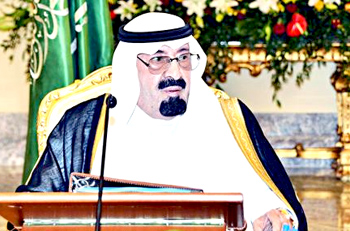 Jeddah, May 7: Custodian of the Two Holy Mosques King Abdullah reiterated the role of the media in promoting peace and stability across the world during the three-day Asia Media Summit 2014, which was inaugurated here on Tuesday.
Jeddah, May 7: Custodian of the Two Holy Mosques King Abdullah reiterated the role of the media in promoting peace and stability across the world during the three-day Asia Media Summit 2014, which was inaugurated here on Tuesday.
“We hope this summit will strengthen media cooperation between Asian countries,” said the king in his keynote speech, which was read out by Culture and Information Minister Abdul Aziz Khoja.
King Abdullah reminded media personalities of their responsibility in disseminating accurate information and appealed to them to propagate sound ideas that encourage reconciliation and harmony.
“The message of Islam, which originated from this country, insists that good words should be the basis for disseminating noble values to improve human behavior in order to build a better civilization,” said the king.
The king cited a Qur’anic verse to reinforce his message. “Have you not considered how Allah presents an example, (making) a good word like a good tree, whose root is firmly fixed and its branches (high) in the sky? It produces its fruit all the time, by permission of its Lord.”
The king warned against using the media to negatively influence public opinion. “Countries around the world are exposed to extraneous cultural influences that shake the foundations of humanitarian and religious values because of the dissemination of irresponsible media content,” he said. “We request that media experts use their influence constructively.”
The king exhorted the media to respect religious values and fortify the fence of morality.
He also stressed the role of the media in ending the tragedies and clashes afflicting the world.
“It is no secret that man-made tragedy fills media outlets these days,” he said.
“This is where the role of responsible media reporting comes in.”
Riyadh Kamal Najm, president of the General Authority for Audio and Visual Media, said the summit offers a good opportunity for government officials and executives to exchange views on improving media management in Asia and other parts of the world.
He emphasized the growing role of media in educating the public. “Media organizations have played an important role in boosting development in the Third World countries,” he said.
Najm emphasized the need for powerful media organizations that can shape public opinion on various political, economic and social issues.
“We have achieved unprecedented progress through information technology, including computers and cellphones, which has changed the way people get information,” he said.
He called for the need to stop misusing information technology and social media sites. “We need regulations that can help weed out and check mischief-makers and troublemakers,” he said.
In her inaugural address, Rosarita Niken Widiastuti, president of the Asia-Pacific Institute for Broadcasting Development and director of Radio Republic Indonesia, thanked Saudi Arabia for hosting the summit and praised the Kingdom for playing a positive role in promoting media ethics.
The conference provides a platform for broadcasters in the region to share their thoughts on broadcasting and information. In attendance are decision-makers, media professionals, scholars and stakeholders of news and programming companies from Asia, Pacific, Africa, Europe, Middle East and North America.






Comments
Add new comment